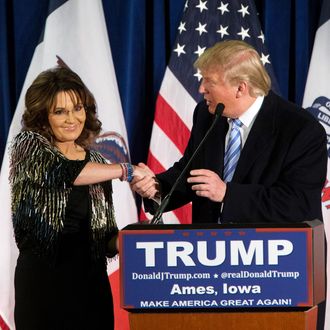
It’s been a very difficult week for the in-house Republicans of the New York Times editorial page. First David Brooks had a public meltdown in a column calling for a “conspiracy” to keep the GOP presidential nomination out of the hands of Donald Trump or Ted Cruz. Then, in the wake of Sarah Palin’s endorsement of the Donald, Ross Douthat came forth with a confession that “eggheads” like his own self had stood by and let demagogues preempt the working-class-focused reform-conservative movement. Worse yet, he admitted, his initial reaction to the proto-Trump from Alaska had been one of adoration as he defended her against her snooty critics.
Those snooty critics will enjoy Douthat’s horrified recognition of his “romance” with Palin, whom he viewed as the embodiment of the “Sam’s Club Republicanism” he had called for in a much-discussed 2005 essay co-written with another future “reform conservative,” Reihan Salam. He “identified” with Palin as a working-class conservative heroine instead of examining her carefully as a journalist. Thus he was mortified when she turned out to be “her critics’ caricature, embracing a mix of willful ignorance and proud ressentiment” (leave it to an “egghead” to deploy the French version of resentment, which was used by Frederich Nietzsche to convey a deep, soul-wrenching hatred of one’s betters).
Douthat doesn’t end his confession with sodden regret at an embarrassing infatuation. Like another writer sometimes identified as a Reformicon, David Frum, he considers the possibility that Palin and her new friend Trump are precisely what working-class Republicans want, at least as compared to the economic elites whose control of the GOP the “populist” tycoon and his followers are challenging. But unlike Frum, Douthat seems to have a sense of personal responsibility for the resulting disaster.
[I]n a certain way, Trump and Palin together on a stage is the closest American politics has come to offering the populist grand new party that Salam and I called for two presidential campaigns ago.
Except that it isn’t what we called for, because we wanted a populism with substance — one that actually offered policy solutions to stagnant wages and rising health care costs, one that could help Republicans reach out to upwardly mobile blacks and Hispanics as well as whites, and so on down an optimistic wish list.
As it turns out, though, the Reformicon effort to talk Republican presidential candidates into nestling some family tax credits into their massively regressive tax plans, or to go a little easier on “entitlement reform,” were laughably puny attempts to save GOP elites from themselves.
[A]t a certain point disillusionment with the system becomes so strong that no wonkish policy proposal is likely to resonate anymore. So you can talk all you want (as Marco Rubio’s water-treading campaign has tried to do) about improving vocational education or increasing the child-tax credit, and people will tune you out: They want someone who will arm-wrestle the Chinese, make Mexico pay for the wall, smite our enemies and generally stand in solidarity with their resentments, regardless of the policy results.
Since this is a recipe for American-style Putinism, it’s not exactly a good sign for the republic that it seems to be resonating. But those of us who want a better, saner and more decent populism than what Donald Trump is selling need to reckon with the implications of his indubitable appeal.
I’m guessing Douthat is hardly alone among Republican opinion-leaders in judging Rubio’s once-promising campaign as “water-treading” and far from being an answer either to Trump’s “Putinism” or to the Goldwater-redux stylings of Ted Cruz. If what David Brooks fears will happen in Cleveland in July does transpire, Reformicons may have to offset smug claims that they tried to warn the Establishment of their peril with an acknowledgment that they did too little, too late, to offer an alternative.






























